Well, who started it then? The immortal words of Head Teachers everywhere. The origins of the Jewish/Arab conflict belong to their ancient tribal history. We know quite a lot due to that well-known book the Bible. However, in our current era, the state we refer to as Israel has its origins in 1948. In this post World War Two period the British and French division of the Middle East came to an end. It was in 1948 that the British Army left Palestine, and it was in 1948 that the war broke out. Who started the war, why, and the consequences are clearly still relevant today.
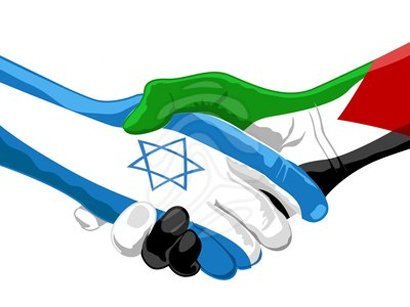
Public Domain
Last week the US quit the "biased" UN Human Rights council for which they were praised by Benjamin Netanyahu, the Israeli Prime Minister.
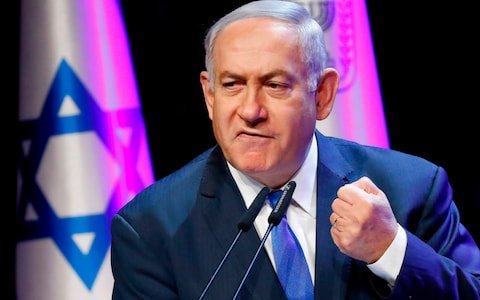
Telegraph
This is because Israel is the only country that is subject to a permanent standing agenda item over its treatment of Palestinians. Nikki Haley, US Ambassador to the UN, said last year that it was "hard to accept" motions passed against Israel but not Venezuela where dozens of protesters had been killed. Meanwhile, in the latest round of protests in Gaza 60 have died and over 13,000 have been injured, Haley praised the Israeli's for their "restraint".
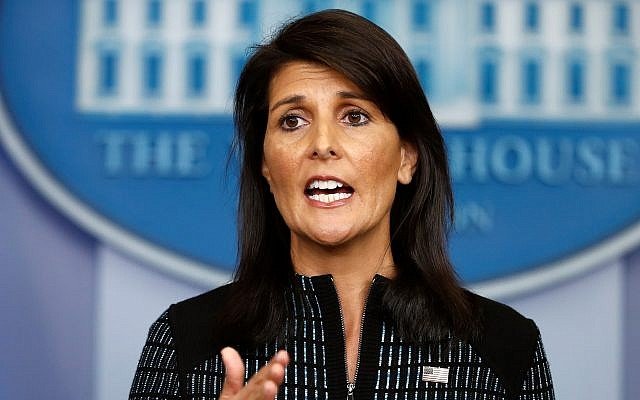
Times of Israel
The entire Middle East region is important in world politics due to its strategic location and its oil. Before World War Two the French and British had the area divided up between them into zones of control (see the Sykes-Picot Agreement). The British 'owned' Palestine, technically termed a "Mandate" and had promised it to both the Jews (in 1917 in the Balfour Declaration) and the Arabs (in 1915 in the McMahon-Hussein correspondence). The main competitor at the time was the Ottoman Empire. Later, Germany wanted a slice of the action, and this is why North Africa became an important secondary front in world war 2. We can see that the British Empire had employed an age old tactic called divide and rule, Jews v Arabs.
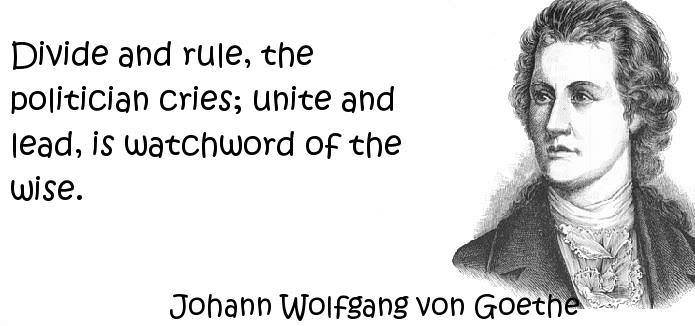
Public Domain
The outbreak of anti-Semitism in Europe, especially Nazi Germany, resulted in a huge boost for the panacea of Zionism. Zionism being the doctrine that the Biblical lands of Israel must be reclaimed from the Arabs who kicked them out. To establish a wholly Jewish state, and remove the Palestinians. For those who had survived the horrors of the camps it seemed like the answer, a homeland, somewhere this would never happen again. Where Jews would be strong.
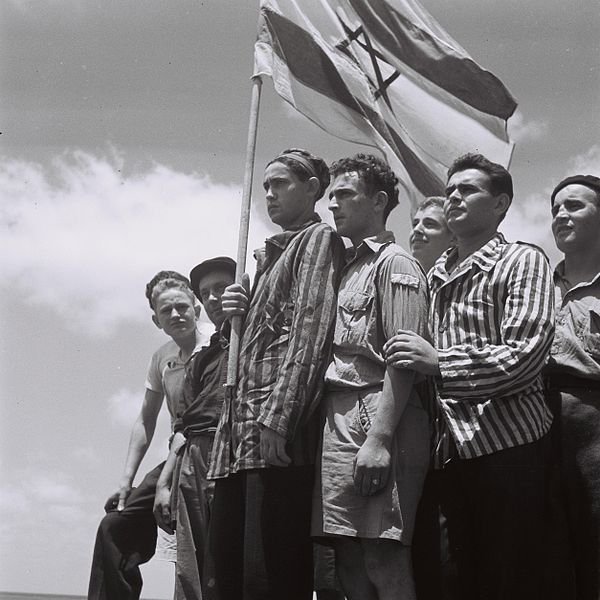
http://murals.wbtla.org/historic-collage-images.html
Before 1939 the British had encouraged Zionist settlement in the area. When the settlers had first arrived in the second half of the nineteenth century they came with good intentions. Cultivating the land and building experimental Kibbutz (communes), living together and sharing equally the product of their labour. Although they were also your typical colonists, in that they didn't give too much concern to the people already living on the land. At this time amounting to about 2 million Palestinians. Many of the settlers, escaping persecution (and Europe has a really long history of this), believed they had commendable rights to the land.
By 1941 Jewish settlers amounted to 30% of the population. Britain tried to put limits on Jewish immigration. It famously refused permission to the Jews escaping Germany on the boat the "Struma" which was later sunk killing nearly all onboard. After World War Two the Jewish Agency, despite British efforts to stop them, started shipping Jews to Palestine. Already by May 1947 the Jewish Agency had been drawing up a map which designated the majority of Palestine to the Jewish settlers. Jewish settlers actually got involved in terrorist activities against the British (like blowing up the King David Hotel - British high command), until finally tired and demoralised the British Imperial forces packed up and left in May 1948. The British Empire had wanted a patchwork, easy to control country. However, they had underestimated the forces driving Zionism.
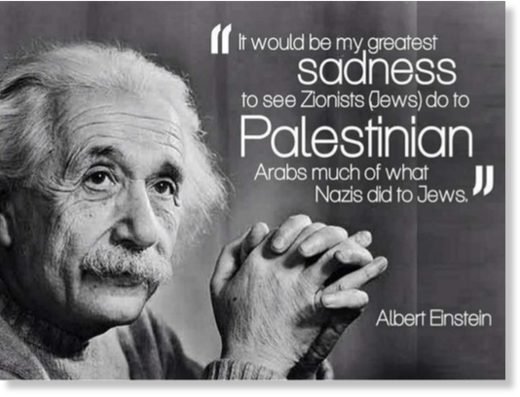
Public Domain
In 1947 the British referred the matter to the UN. In 1948 the UN proposed to partition the country, giving the Palestinian Arabs 47% of the land despite owning 92% of the country. The British abstained from the vote. They had no desire to see a strong Jewish state in an area they still had vain hopes of keeping some control over. However, the British Empire simply had too many ongoing problem areas (like a rebellion in India led by Ghandi) to contend with at any one time. The British wanted out, and the troop commanders had strict instructions not to get involved in the fermenting conflict between the Palestinians and the Jewish Zionists.
Obviously, the Palestinian Arabs rejected the UN proposal, why would they agree to such a blatantly unfair deal when they comprised the majority of citizens in the country. Facing the formation of the state of Israel, the Arab nations began arming and preparing to try and prevent this development. A Jewish state they believed would be a divisive and an anti-Arab creation, and they feared what it would mean for the weak Palestinian nation. In this endeavour they were supported by the British Empire, especially through British allies the Muslim Brotherhood and the kingdom of Jordan. The ensuing conflict is called the war of independence by the Jewish state and the Naqba (catastrophe) by the Palestinians. It is a matter of history that Israel won decisively.
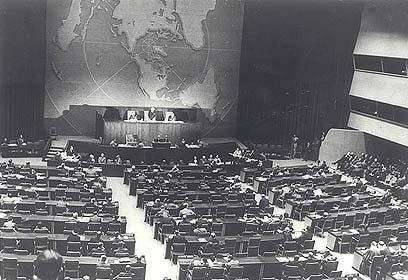
https://www.foreignpolicyjournal.com/2010/10/26/the-myth-of-the-u-n-creation-of-israel/
An examination of the actual events in 1948 is illuminating. Omitted from the Israeli narrative are the forcible expulsions of Palestinians from their homes, massacres (such as at Deir Yassen), village burnings and rapes. Instead, Israeli history is full of heroic deeds and moral courage as the beleaguered Jews fought for their independence. Of course, the Arabs also took part in massacres, such as Hadassah Hospital, the kibbutz Kfar Etzion and the siege of the Jewish Quarter in Jerusalem here. Not mentioned in Israeli textbooks though are the five hundred Palestinian villages and eleven urban neighbourhoods that were utterly destroyed to create room for the new settlers. Nor the 750,000 Palestinians that were expelled from their homes and several thousand that were killed. Ilan Pappe in Gaza in Crisis asserts that this was deliberate ethnic cleansing and was planned in advance and continued well into the 1950s.
In 2007 the opening of archive material by the International Committee of the Red Cross (ICRC) exposed that Israeli Zionists had used biological weapons in 1948 in an Operation called Shlach Lachmecha . (Covered in Wendy Barnaby's book Plague Makers). In April 1948 the city of Acre was besieged. During the siege the Zionists injected Typhoid into the local water aqueduct. At least 70 civilians died before population controls, inoculations and water chlorine solution was applied. 55 casualties were British soldiers who were flown to Port Said for treatment. Intensification of the bombing campaign continued until Acre was taken. Evidence was also revealed of thwarted attempts to poison the water supply of Gaza. It has been suggested that this was a way to prevent any return and resettlement.
From the first day of its creation Israel has been a country surrounded by hostile forces. The fact is despite its victory Israel required outside support to maintain itself. Through German "reparations", American subsidies, and a high number of wealthy patrons it kept going financially. This led to a situation where Israel was dependent on others, and so had little independence and undoubtedly felt constantly threatened. The strength of the Jewish lobby in Washington seeks to ensure they always have an influence over American policy in the Middle East. The state of Israel have assisted the US at all times, for example, they are currently firing missiles into Syria. Although, in the longer term, being seen as a US lapdog has worked against finding any ground for peace with their neighbours.
The Arab world, we must remember, was in a state of flux as the British and French withdrew/were forced from the area. The newly independent ex-colonies were left with weak militaries, no effective governments and very little money. Authoritarian regimes became common, nationalising their country's assets and requiring to look to Russia for loans. For example, President Nasser looked to the Soviet Union to help build the Aswan Dam in Egypt. In Syria, an officer caste had taken over running the country however due to their weakness they mobilised the Palestinian refugees for support, and orchestrated so-called reprisal attacks on Israel. Syria became the centre for Arab resistance and a training centre for Arab volunteers for "The Arab Rescue Army".
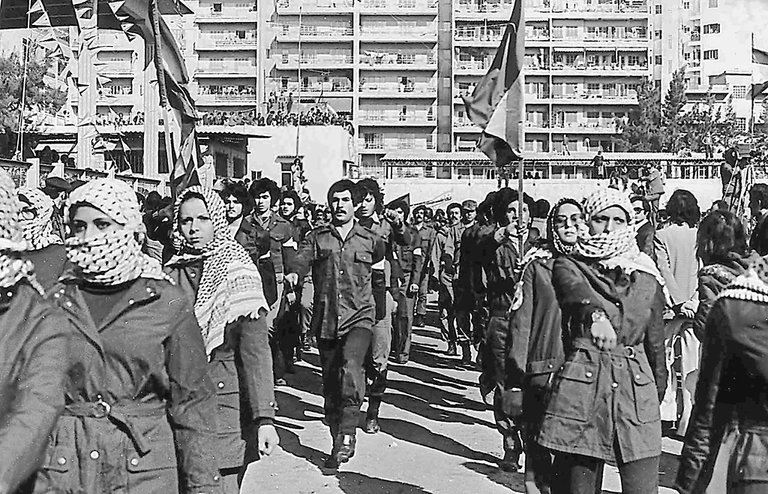
https://en.wikipedia.org/wiki/Palestinian_fedayeen
So, in a pre-emptive move, in 1956 Israel was involved in the British/French invasion of Egypt when they seized the Sinai Peninsula. The UK/France were outraged over Nasser’s nationalisation of the Suez canal. Later UN forces were stationed between Egypt and Israel to "keep the peace". Then Israel invaded Syria. The other Arab nations were incensed by this action. Nasser marched his troops and re-took Sharm-el-Sheikh (now a popular tourist spot), and called for a holy war against Israel. Most of the other Arab countries felt compelled to join with Egypt. Obviously the main powers were involved too. Russia supplied arms to Egypt and Syria whilst the US/Britain/France armed Jordan, Saudi Arabia and Israel. A division of support that is palpable today in Middle East events.
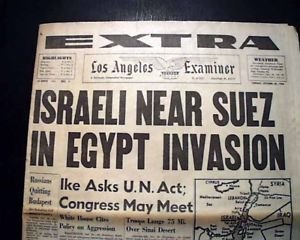
The decisive victory for Israel in 1956 did strengthen their position immeasurably. Ironically, it also further cemented hatred of the state of Israel in the region amongst the masses of the Arab world. This is the bind of Zionism for the Jews. Nasser wanted to unite the entire Arab world, however both the monarchies of Saudi and Jordan were (are still) Western puppets. However, the masses were united by their hatred for Israel, and this became an important rallying cry for any would-be populist leader, especially as barely a year goes by when the Israeli government are not launching a campaign, if not an all out assault, against the Palestinian people.
Visits from Presidents Bush, and then Obama, both pushing a two state solution have been roundly rejected by the Israelis. An aggressive expansionist agenda by the Zionist state on the West Bank, has seen the territory of Palestine reduced to a series of enclaves highly reminiscent of apartheid South Africa’s bantustans.
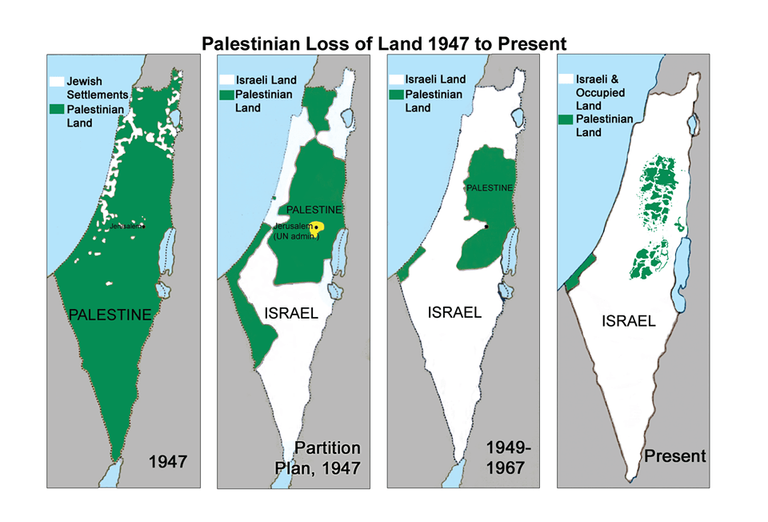
Public Domain
It is an historical irony that a people who suffered so much at the hands of the Nazis now have their own state in which any remaining Palestinian Arabs (about 4 million) are segregated by their race and religion and consigned to live in squalid ghettos. As 750,000 Palestinians were driven from their homes in 1948, 600,000 Jews fled or were driven from their homes throughout the Arab world. Most of the Jews were accepted into Israel, unfortunately most of the Palestinians remain refugees to this day. Many Palestinian families still hold on to their old front door keys, symbolising their desire to return to what they see as their homeland.
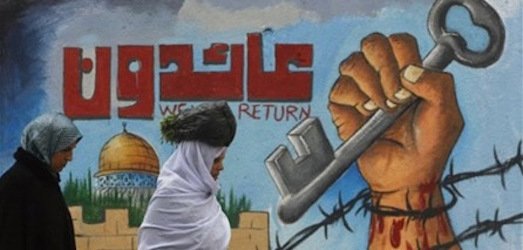
https://dailyfreier.com/category/al-naqba/
Zionism equates anti-Zionism with anti-Semitism. It then takes it further by stating that Jews are special and inherently different from their Arab neighbours. This is the ideological basis for the creation in 1948 of the Israeli state, an explicitly race pure state. Any criticism of Israel, both in challenging its existence to its conduct towards the displaced Palestinians is labelled anti-Semitic and dismissed. Equally, the Arab position has hardened into a fierce anti-Israeli stance which represents all Jewish things bad. For decades groups like the PLO and Hamas have voiced threats of driving the Jews from the land. This only reinforces the sense of threat experienced by people who live in Israel. The Israeli state plays up these fears to ensure high levels of military spending and repression towards the Palestinians are maintained. Under such conditions, any massacre, any invasion, any violation of human rights can be presented as defensive.
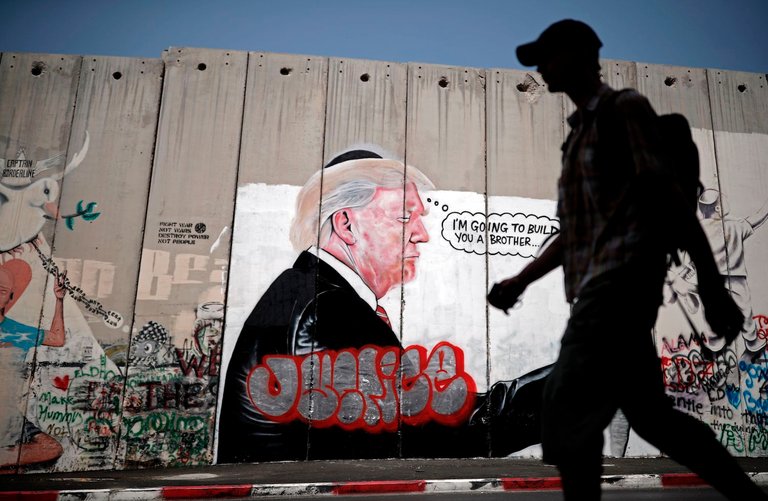
However, whilst the Jewish state is based on an aggressively expansionist model, bulldozing Palestinian homes, and keeping Palestinians as open air prisoners, the masses of the Arab world will continue to hate Israel. Meanwhile, portrayed as the only democracy in the Middle East, Israel receives a light touch from the Western media for any of its War Crimes. After all, they didn't start this conflict. This is fully illustrated by Nikki Haley's comments see here after the most recent atrocities committed by Israel against Palestinian protestors by blaming it on Hamas and Iran. Danny Danon, Israel Ambassador to the UN, said
“Everyone who claims the decision to move the US embassy is the reason, or the justification, for Palestinian violence should take another look at history. This is an excuse, not a reason for violence against Israel.”
The UN officials have disagreed and an investigation has been called for. The Spokesperson for the UN High Commissioner for Human Right, Rupert Colville, later released a statement calling Israel’s actions in Gaza “appalling.” We therefore reach a situation where the US, under criticism of its own treatment of refugees, has withdrawn from the UN Human Rights Council.
The Arab-Israeli conflict has deep seated historical roots going back to at least 8000 BC when the Assyrian King exiled the Jews from their homeland. If this intractable conflict is ever to be resolved we must start from the principle that everyone has the right to their own homeland. The insecurities, fears and injustices felt by ordinary people on both sides of the conflict must be addressed in a way that allows for peaceful reconciliation and the ability to coexist in a democratic way. The alternative is a continuation of the present nightmarish conflict that guarantees further bloodshed and suffering. We should be aware that 'divide and rule' has been an effective strategy for retaining power. Whilst we have: black v white; Arabs v Jews; Christians v Muslims; we will remain fighting amongst ourselves and not against the ruling elite. The only way forward is to be cognisant of this tactic and promote unity. The Zionist plan for a homeland can be understood, especially following the atrocity that was the Holocaust. However, concentrating the Jews of the world in a small, exclusive and militarised state, at the expense of the people living there, evoking hatred amongst its neighbours, has not proven to be the best way to solve anti-Semitism.
Sources
Ilan Pappe and Noam Chomsky, Gaza in Crisis, 2010, ISBN 9780141399515
The Contradictory Promises
Chemical Weapons Use
Barnaby, W, 'Plague Makers, The Secret World of Biological Warfare', Third Edition, ISBN 9780826414151
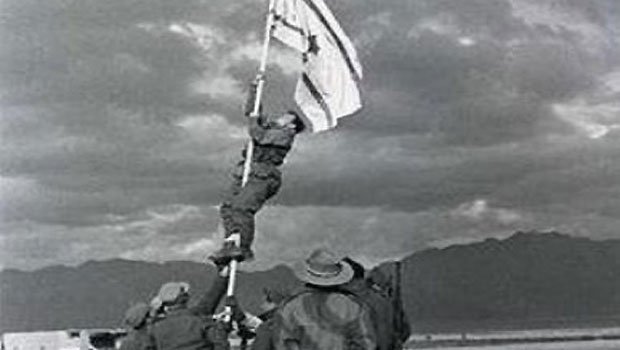
This post was resteemed for FREE, by @rcr.bis Resteem Service.
Follow @rcr.bis to have your posts upvoted and resteemed plus a chance to win @steembasicincome shares.
Your Post Had Been resteemed on @sam-resteem
resteem your steemit post using sam-resteem platform
--how it works:--
post your steemit URL post following this link below
https://busy.org/@sam-resteem/resteem-your-content-18
Thanks for using sam-resteem platform
Follow @sam-resteem
Your post was resteemed by @resteemza
Please upvote this reply to help us grow
Good job @saltycat, your post is very good. Congratulation.
Thank you for participating in my competition.
Upvote and resteem to my 768 followers.
Yes please thanks for your supportive comment. I was not sure what kind of response the article would get.